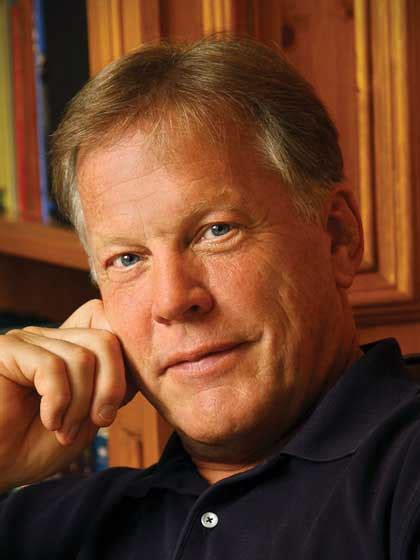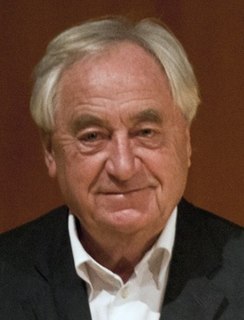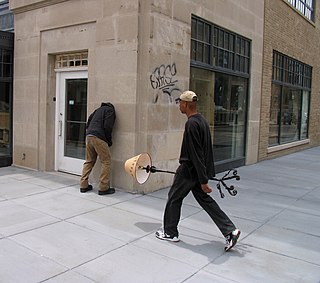Top 317 Encounters Quotes & Sayings - Page 6
Explore popular Encounters quotes.
Last updated on April 21, 2025.
Conversations...begin with the sort of imaginative engagement you get when you read a novel or watch a movie or attend to a work of art that speaks from some place other than your own. So I'm using the word 'conversation' not only for literal talk but also as a metaphor for engagement with the experience and ideas of others. And I stress the role of the imagination here because the encounters, properly conducted, are valuable in themselves. Conversation doesn't have to lead to consensus about anything, especially not values; it's enough that it helps people get used to one another.
Fear is so fundamental to the human condition that all the great spiritual traditions originate in an effort to overcome its effects on our lives. With different words, they all proclaim the same core message: "Be not afraid." Though the traditions vary widely in the ways they propose to take us beyond fear, all hold out the same hope: we can escape fear's paralysis and enter a state of grace where encounters with otherness will not threaten us but will enrich our work and our lives.
A moment of grace. There rose up within me a profound sense of being loved. I felt "gathered together" and encircled by a Presence completely loving, as if I were enveloped by the music of a love song created just for me. It was not overwhelming or even emotional. Just a warm knowing that I was in God's loving embrace...centered and unified there. [Love]encounters cannot be analyzed, only shared. If you take a butterfly, Robert Frost said, and pin it down into a box, you no longer have a butterfly.
I've kept the people who've been in my career who I feel are my family. Kathy [Kennedy] had been with me since 1978. Janusz Kaminsky, my cinematographer, has made every movie with me since Schindler's List. Michael Kahn has cut every movie I've directed since 1976 when we made Close Encounters together. Rick Carter has done more than 15 of my directed films as a production designer.
I have an unquenchable desire to slow down and find my life going deeper in my walk with Christ. I want to meet him in the depths of my soul, away from the stress and press of everything on top. A relationship with Christ is the key to fulfilling our deepest longings. All of life is about filling the void that sin and separation from him have created within. Filling the emptiness with piles of things, earthly friendships, satisfying experiences, and sensual encounters ultimately proves to achieve less than what we had hoped for. Christ is the only one who fits.
So-called real life has only once interfered with me, and it had been a far cry from what the words, lines, books had prepared me for. Fate had to do with blind seers, oracles, choruses announcing death, not with panting next to the refrigerator, fumbling with condoms, waiting in a Honda parked round the corner and surreptitious encounters in a Lisbon hotel. Only the written word exists, everything one must do oneself is without form, subject to contingency without rhyme or reason. It takes too long. And if it ends badly the metre isn't right, and there's no way to cross things out.
He knows no other way but ugliness,” Sir Topher said quietly. “He was taught no other lessons but those of force. His teachers have been scum who live by their own rules. No one has ever taught him otherwise.” “Am I to forgive?” she said, her voice shaking with anger. “No,” he said sadly. “Pity him. Or give him new rules. Or put him down like a wild animal before he becomes a monster who destroys everything he encounters.
There are houses in certain provincial towns whose aspect inspires melancholy, akin to that called forth by sombre cloisters, dreary moorlands, or the desolation of ruins. Within these houses there is, perhaps, the silence of the cloister, the barrenness of moors, the skeleton of ruins; life and movement are so stagnant there that a stranger might think them uninhabited, were it not that he encounters suddenly the pale, cold glance of a motionless person, whose half-monastic face peers beyond the window-casing at the sound of an unaccustomed step.
There is a time when every person who encounters Jesus, who believes Jesus is the Son of God, decides that they will spend their life following Him. Some people, like the Apostle Paul, make this decision the minute they meet Him, the minute they become a Christian. Others, like the Apostle Peter, endure years of half-hearted commitment and spiritual confusion before leaping in with all their passion. Still others may enjoy some benefits of God's love and grace without entering into the true joy of a marriage with their maker.
I've come to the conclusion that it's all about fear- fear that your kid won't come out on top, be a success. Forcing him into these brutal encounters will a) make a dame sure he is a success, and b) all you to see evidence of that success with the added bonus of a cheering crowd. This means that sports are supported with an almost desperate enthusiasm. The football team gets catered dinners before a fame. Honor Society is lucky if it gets a cupcake. Academic success-forget it. That requires too much imagination. There's no scoreboard.
The observations and encounters of a solitary, taciturn man are vaguer and at the same times more intense than those of a sociable man; his thoughts are deeper, odder and never without a touch of sadness. Images and perceptions that could be dismissed with a glance, a laugh, an exchange of opinions, occupy him unduly, become more intense in the silence, become significant, become an experience, an adventure, an emotion. Solitude produces originality, bold and astonishing beauty, poetry. But solitude also produces perverseness, the disproportionate, the absurd and the forbidden.
Philip Galanes has fashioned a novel both bleak and funny about a young man's struggle to sort out his troubled love: the too-strong love for his mother, the too-weak love for his suicidal father, and the all-consuming love of anonymous sexual encounters. Pointed and acute, this story tells of the narrator's many betrayals of others and their many betrayals of him. It exists in an uncomfortable moral space where the humor of terrible things sometimes outweighs, but never obscures, their poignancy.
Adventure is a path. Real adventure - self-determined, self-motivated, often risky - forces you to have firsthand encounters with the world. The world the way it is, not the way you imagine it. Your body will collide with the earth and you will bear witness. In this way you will be compelled to grapple with the limitless kindness and bottomless cruelty of humankind - and perhaps realize that you yourself are capable of both. This will change you. Nothing will ever again be black-and-white.
The pulp hero, though he may be a renegade, is a guy who doesn't feel. Anything. Ever. And for the adolescent male - pummeled by emotions left and right, whether arising from sexuality or resulting from his necessary encounters with authority - this hero is a blessing, a relief and a release. The world he lives in, where feelings are totally under control, looks to the adolescent boy like heaven! This hero's lack of feeling - like Star Trek's Spock - is what allows him to be a genius, or allows him to shoot the bad guys and/or aliens, without a quiver to his lip.
Anybody hear the great news, today? Jimmy Swaggart under investigation! Oh Ja-eezus! One day every one of those cocksuckers will get caught! I understand in the case of Mr. Swaggart, that he claims that it was not multiple encounters with many prostitutes - apparently, only one sweet young thing. And he did tell Cal Thomas of the Moral Majority that the sex act itself was not fully consumated. However he did admit to doing something por-no-graphic with the girl. Let's use our imaginations, ladies and gentlemen.
This worship, given therefore to the Trinity of the Father and of the Son and of the Holy Spirit, above all accompanies and permeates the celebration of the Eucharistic liturgy. But it must fill our churches also outside the timetable of Masses. Indeed, since the Eucharistic mystery was instituted out of love, and makes Christ sacramentally present, it is worthy of thanksgiving and worship. And this worship must be prominent in all our encounters with the Blessed Sacrament, both when we visit our churches and when the sacred species are taken to the sick and administered to them
We are difficult. Human beings are difficult. We're difficult to ourselves, we're difficult to each other. And we are mysteries to ourselves, we are mysteries to each other. One encounters in any ordinary day far more real difficulty than one confronts in the most “intellectual” piece of work. Why is it believed that poetry, prose, painting, music should be less than we are? Why does music, why does poetry have to address us in simplified terms, when if such simplification were applied to a description of our own inner selves we would find it demeaning?
















